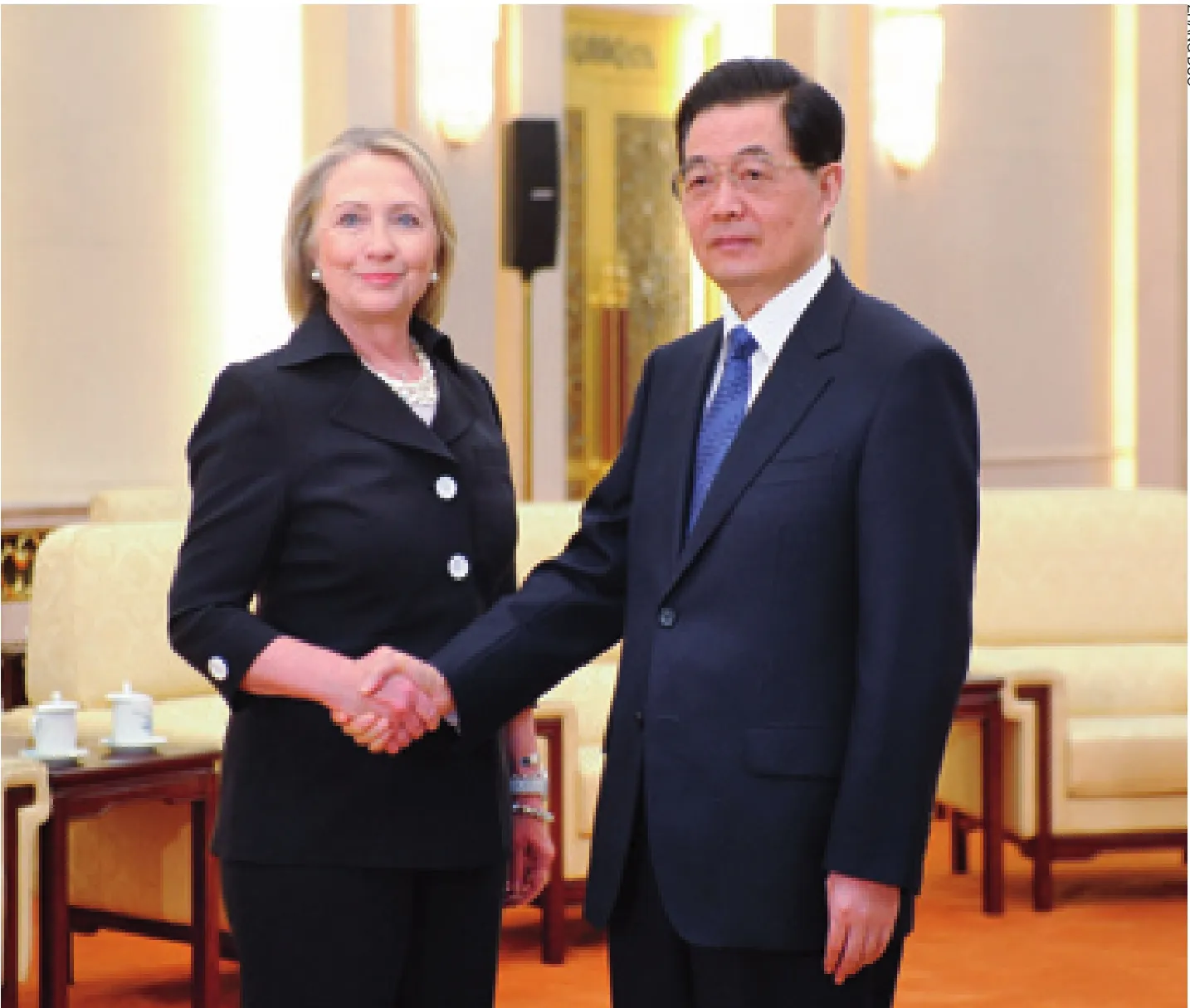China and U.S. at Odds Over Islands
2012-10-14ByDingYing
By Ding Ying
China and U.S. at Odds Over Islands
By Ding Ying
Tightened tension of territorial disputes is hurting mutual trust between China and the United States

BuiLDiNG TRuST: Chinese President hu Jintao meets visiting u.S. Secretary of State hillary Clinton in Beijing on September 5
W ith Washington’s high-tune claim of shifting the focus of its foreign policy toward the Asia-Pacific region, the quiet ocean is being stirred up. The growing tension is jeopardizing not only regional peace and stability, but also mutual trust between China and the United States.
Chinese observers have criticized the U.S. bias toward regional tension, stressing that the two sides must refocus on promoting mutual trust, so as to put the bilateral relationship back on the right track.
U.S. double standards
U.S. Secretary of State Hillary Clinton visited China on September 4 and 5 as part of an 11-day tour of Asia. This was likely to be Clinton’s last visit to China as the U.S. secretary of state. She had paid seven visits to China previously—four visits for the China-U.S. Strategic and Economic Dialogue and another three for the High-Level Consultation on People-to-People Exchange.
Observers pointed out that the visit could be considered a farewell tour by the departing secretary of state. However, considering the escalating tension in Asia, especially the dispute over the Diaoyu Islands between China and Japan, it was more like a fire-fighting tour. They reckon the U.S. bias over territorial disputes is likely to encourage Japan’s irrational actions regarding the Diaoyu Islands issue.
“Clinton’s visit was definitely connected to the regional tension,” Yu Wanli, an associate professor with the School of International Studies, Peking University, toldBeijing Review. He explained that Clinton hoped to convince China to “restrain” itself over the Diaoyu Islands dispute, while trying to press China to accept a code of conduct in the South China Sea.
“Clinton set fire to the Diaoyu Islands issue as part of U.S. foreign policy turning its focus to the Asia Pacific, showing an obvious intention to contain China. Now the fire is so big that it is going to be out of U.S. control,”Yu said.
According to Kyodo, an influential Japanese news agency, the Japanese Government has agreed on terms with the Kurihara family, which claims to own the Diaoyu Islands, to buy the islands on September 5. The report said the Central Government of Japan agreed to pay 2.05 billion yen ($26.15 million) for the “purchase”of part of the chain of islands in the East China Sea.
Yu recalled that the Diaoyu Islands issue essentially had been under control during the past decades. But the situation became tense in recent years, especially after the United States declared it was shifting the focus of its foreign policy toward the Asia Pacific. Yu said as Washington sticks to a principle of giving its allies priority, its Asia-Pacific policy has an obvious bias. Although the United States iterated it doesn’t “take a position” on the dispute over the Diaoyu Islands, it has repeatedly claimed that the U.S.-Japan Security Treaty applies to the Diaoyu Islands.
Under the 1960 treaty, Washington will provide assistance to Tokyo when the territories under Japan’s administration come under armed attack. Since the Diaoyu Islands are part of China’s inherent territory, the Chinese Government has voiced opposition to U.S. statements that put the islands within the scope of the treaty.
Yang Xiyu, a senior research fellow with the China Institute of International Studies (CIIS), said U.S. tactics on the Diaoyu Islands reflected its ambivalence. Yang explained that, on the one hand, Washington wants to act with an image of a protector of Japan; on the other hand, it doesn’t hope to pay an actual price for the protection. “The ideal status for the U.S. side is: The dispute over the Diaoyu Islands continues forever, but without the danger of escalating into a fight,” Yang concluded.
The United States, which claims not to take sides in disputes between China and some of its neighbors, is somewhat blamed for rising tension due to its de-facto support of the parties opposite to China, especially its allies Japan and the Philippines.
Yang mentioned that although the United States declared it doesn’t take a position on territorial disputes in Northeast Asia, its stances are quite different. On the Japan-South Korea dispute over Dokdo Island, which Japan calls Takeshima, its stance is impartial because the related two countries are both its allies. But its actual attitude is biased toward the Japanese side on the Diaoyu Islands issue.
“Current escalating tension over the Diaoyu Islands was started by the Japanese side, so why does Washington require China to show restraint?” said Yang, pointing out that the U.S. attitude is actually encouraging to Japan.
Yang believed that Washington is also ambivalent on China: It wants to create a tense security environment in China’s neighborhood to contain China’s development. But it also needs to promote cooperation and mutual trust to satisfy common interests between them. Want it or not, U.S. tactics on the Diaoyu Islands and Asia Pacific are starting to hurt mutual trust between the two biggest economies in the world.
“Current escalating tension over the Diaoyu Islands was started by the Japanese side, so why does Washington require China to show restraint?”
—Yang Xiyu, a senior research fellow with the China Institute of International Studies
Calls for respect
Both China and the United States have realized the hidden dangers and are trying to bolster mutual trust through high-level exchanges. Following Clinton’s visit, U.S. Defense Secretary Leon Panetta is scheduled to visit China in mid-September. Observers believed that both Clinton and Panetta’s visits are targeted at stabilizing the bilateral relationship. They called for efforts to enhance mutual trust based on respect for each other’s core interests.
Jin Canrong, a professor with the School of International Studies at Renmin University of China, pointed out Clinton’s other goal during her recent trip was to clarify that the adjusted U.S. policy regarding the Asia Pacific is not targeted at China. Jin said there were criticisms inside the United States because the adjusted Asia-Pacific policy is offensive and fruitless. He hoped that Clinton and Panetta’s communication with China could help to diminish tension between the two sides.
Jin pointed out that some countries try to gain extra profit for themselves by hitching onto the U.S. foreign policy shift, causing many problems in China’s neighborhood. And China feels bad about the current situation in the region. “Now the atmosphere of the Sino-U.S. relationship is not very good. But the basic structure of the relationship, which combines competition amid cooperation, is still the same,” Jin said.
Yu of Peking University believed that both sides need to show sincerity and make an effort to promote mutual trust. “Of course there is mutual trust between the two countries. But the current mutual trust is not enough to ease their suspicion of each other’s strategic intention,” Yu said.
He explained that mutual trust includes two directions. The positive direction is to conduct cooperation, while the negative direction is mainly to keep crisis between two countries under control. Now China and the United States are focused on how to control conflicts more than how to promote cooperation, Yu said. He pointed out that mutual trust cannot be promoted solely by China, because it is also determined by U.S. strategic interests.
Jia Xiudong, a researcher on U.S. studies at the CIIS, said it is understandable that the United States has its interests in the Asia Pacific. However, Jia underlined, the United States cannot sacrifice China’s interests when increasing its strategic, political, economic and security input. Jia pointed out that Washington must remember three principles: China is not a challenger of existing international orders; don’t try to challenge China on issues concerning China’s core interests; and provoking dissension in China’s neighborhood will bring the United States more loss than gain. “Respecting each other’s core interests is pivotal to keeping the bilateral relationship under healthy development,” Jia said.
Sovereignty and territorial integrity are undoubtedly among China’s core interests.“China, like all other countries in the world, has an obligation to safeguard its sovereignty and territorial integrity,” Chinese Foreign Ministry spokesman Hong Lei said at a press conference on September 3.
While China has the sincerity of maintaining a good Sino-U.S. relationship, such a relationship should never be established at the expense of China’s sovereignty and territorial integrity, Chinese analysts said.
